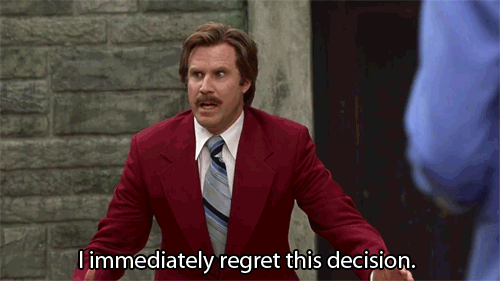8 Things I Learned From Quitting Methadone

via wifflegif.com
I was a patient of a methadone program for only 8 months but, it left a lasting effect on me. I don’t necessarily regret having gone through what I did; it makes for a powerful story to share and has shaped who I am today. My only regret was not informing myself before deciding to enroll in the methadone program (and then later deciding to up and quit cold turkey). When telling my story at a meeting or when facilitating a group, I often like to include the time, in my active addiction, that I decided to get “help” from a methadone clinic. So, here are 8 things I learned from quitting methadone.
#1. I’m a strong motherf*cker

via wifflegif.com
It is often said that quitting methadone is more difficult that kicking heroin or any other drug (see #2). When I abruptly stopped going to the clinic (for reasons described in #s 3, 6, 8), I endured excruciating pain and discomfort, insomnia, restlessness, anxiety, and depression for such an extended period of time – 2 months in all – and endured every bit of it without the aid of other drugs to alleviate my symptoms. Today, when I am facing any kind of problem in my life, I remind myself of those 2 months that I spent on a friend’s couch. I know I can do anything.
#2. Methadone is no joke

via wifflegif.com
Kicking methadone is perhaps the worst drug when it comes to length and severity of withdrawals. It is widely agreed that quitting methadone is more difficult to quit than heroin and other opiates.
#3. Methadone clinics exploit addicts

via wifflegif.com
Methadone is basically legal dope that’s being pushed by the government. They see opiate addicts as a source of profit and not someone who needs real help. That said, it gets to be quite expensive since you have to pay out-of-pocket (it’s not covered by insurance). Here’s a little anecdote: when I had only been going for a couple of weeks, I decided I wanted to quit so, I stopped going. I then received a call from my counselor at the clinic who basically scared me into coming back, saying that I would start going into severe withdrawals (even though I hadn’t yet) and that I wouldn’t be able to go through it alone.
#4. There’s a difference between abstinence and recovery

via wifflegif.com
At the time that I was going to the methadone clinic and then subsequently quitting, I was still in denial about being an addict. I figured that having endured the pain and discomfort of the withdrawals would be enough of a “lesson” to keep me from ever using drugs again. But, I was merely abstaining; I wasn’t recovering. Eventually, I went back to doing heroin and other opiates. Quitting wasn’t enough, I needed to recover.
#5. Methadone is an opiate

via wifflegif.com
It’s actually more addictive than heroin or OxyContin. I’ll let that sink in.
#6. Methadone is not a solution to addiction

via wifflegif.com
While on methadone, I didn’t have to worry about being dope sick but I was still looking for that ‘high’ and so I turned to other drugs, like benzos and amphetamines – all while taking methadone.
#7. Methadone shouldn’t be used long-term

via wifflegif.com
Methadone should really only be used for a brief period of time; it can be good when used as a rapid taper to help manage withdrawal symptoms from other opiates but, methadone is highly addictive and more difficult to ‘kick’ than other drugs.
#8. Staff at methadone clinics are not looking out for your best interests

via wifflegif.com
They are often more interested in increasing your methadone dose than helping you deal with your substance abuse problems and the underlying issues. If you ask to be tapered, they will basically show you that stopping methadone is a bad idea. They do this by slashing the dose – instead of slowly tapering you down – knowing that it will throw you into heavy withdrawal.
If you or someone you love is struggling with substance abuse or addiction, or needs help detoxing from methadone, please call toll-free 1-800-777-9588.
